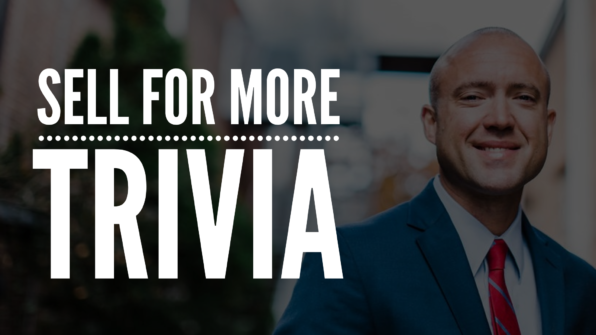Sell for More Trivia is a weekly blog series that playfully presents a trivia question about commercial real estate.
Escrow is when an impartial third party holds on to something of value during a transaction. Escrow is intended to protect both parties.
Earnest Money
When a buyer gets an accepted offer on a commercial property they will ordinarily write an earnest money check that will be placed in “escrow.” That means it isn’t going directly to the seller but is being held by an impartial third party.
If the buyer later exercises a contingency the earnest money will be returned to the buyer. If the deal closes the earnest money will be credited towards the purchase price. If the buyer doesn’t exercise a contingency or close the deal, then the earnest money may be turned over to the seller.
Note: The third party will only turn over the earnest money to the seller if the buyer agrees in writing.
Escrow and lenders
When you are talking with your mortgage lender, you’ll hear about escrow again. They might talk about an “escrow” or “reserves.” They may use these terms interchangeably, and that’s OK because they all mean the same thing. They are funds held by the lender to make payments for your property insurance and property taxes. Some lenders will collect them monthly along with your loan payment and then pay the tax and insurance bills when they are due. That’s because your lender has a vested interest in making sure those payments are made.
Closing of escrow
Finally, you may hear someone refer to the “closing of escrow.” That’s when the sale is completed. A closer or “escrow officer” will oversee the final paperwork and handle the exchange of funds and recording of deeds. This person will ensure that all the money is properly disbursed, that the documents are signed and recorded, and that all necessary conditions are met before closing the escrow.
Once escrow is closed and all funds have been disbursed, buyer and seller will receive a final closing statement and other documents. File the statement with your important papers. You may need it when you file your next income tax return.
Hold back of funds
Sometimes the sale may be completed and ownership transferred while funds are still held in escrow. For instance, perhaps you found something wrong during your final walkthrough of the property. Maybe the seller agreed to make the repair, but the work couldn’t be completed by closing day. Money can be held in escrow to cover the cost.
(FREE PROMOTION) Find out how much your property is worth, for free, before you list it for sale. Get the blueprint to sell your property for the highest price the market will pay (click here)
How to get an unfair advantage. Click here to join Sell for More Club today.
Own a business? 90% of business owners don’t know the market value of their business. If you’re considering selling a business, click here for a free business valuation.
About Beau Beach, MBA CCIM
Beau is a tenacious Commercial Real Estate Broker, author and adoring father of four. His clients appreciate his no-nonsense demeanor and his legendary work ethic.
Beau leads Beachwood which is a commercial real estate broker for sellers in the Nashville, Milwaukee and South Florida markets.
He’s the author of the books The 3 Reasons: Why Most Commercial Properties Don’t Sell and True Wealth: What Every Seller Should Know About 1031 Exchanges.
Beau can be reached at 800-721-3287, click to schedule a call or Beau@soldbybeachwood.com
